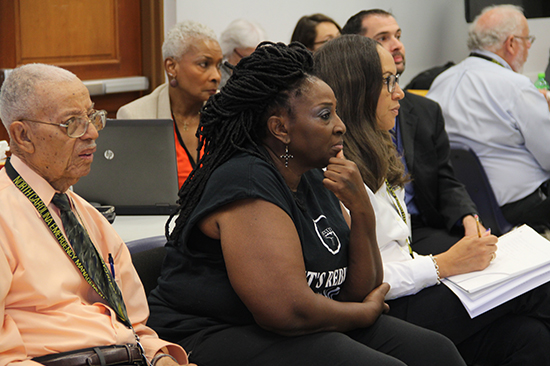|
|
|
|

photo by Mary Lide Parker
 |
The Guava Hunter
From the time he was a child, Brian Reatini has always held an inherent fascination for the natural world. Now, as he pursues his PhD in biology, Reatini has the unique opportunity to collect data from one of the most distinct ecosystems in the world — the Galápagos Islands.

|  |
|
|
 |
|
 |
Welcome
A message from the Vice Chancellor

This month I want to introduce the UNC Research Compliance Learning Community, which is a community of PIs, research study coordinators, research administrators, and research-related IT personnel working collaboratively to ensure the responsible conduct of research and its business processes at UNC.
In spring 2017, it was founded by Lisa Ross in the Office of the Vice Chancellor for Research through a series of research compliance competency development workshops that resulted in the formation of four working groups:
-leadership and science;
-research data management and stewardship;
-finance, business management, legal, and regulatory; and
-people and communications.
The website for the Research Compliance Learning Community is an at-a-glance, at-your-fingertips, all-things-research compliance resource. Users can access compliance information and learning materials on-demand. This website strategy was developed in response to a 150, in-person needs assessment with UNC personnel at all levels of the university. Ross worked closely with the Network for Research Professionals, Research Administrators Support Group, North Carolina Translational and Clinical Sciences Institute, and Internet Security Liaisons in assembling the content of the website. I urge you all to look at the website and encourage dissemination to those that work with you on various research projects.
Terry Magnuson
Vice Chancellor for Research
|  |
|
|
 |
|
 |
News & Updates
From around UNC Research
  
Manager for Research Administration Service Center hired to streamline service delivery
Planning for shared financial and research services for the research division began in 2016, with four UNC Research centers and institutes identified to serve as a pilot shared service center. Those centers are the Center for Developmental Science, the Center for Health Promotion and Disease Prevention, the Howard W. Odum Institute for Research in Social Science, and the Injury Prevention Research Center. Finance and Research Administration staff from the centers assisted in the planning and design.
The planning phase of the pilot began before the announcement of Carolina Service — the university's initiative to create more efficient and effective ways of delivering services and sharing resources in the areas of human resources, finance, information technology, research administration, and communications. In early 2017, it was decided that we merge the Office of the Vice Chancellor for Research's efforts with those of Phase I of Carolina Service. As a result, project teams formed to assess the current processes and requirements through interviews with principal investigators, center directors, and research administration staff from several centers and institutes — not just those involved in the pilot. During the design phase, data was collected and analyzed to create a new way of working that includes staffing needs to support the new model, inventory of activities, roles and responsibilities, and process redesigns. Because subsequent phases of Carolina Service will include the academic units, some staff members from those units were also involved in the process. Yana Biblin has been hired as a manager for the Office of the Vice Chancellor for Research Service Center. She will lead the continuation of the pilot and will contribute to the planning and launch of the new working model in advance of the initiation of Phase I of Carolina Service. This process will include training, transition plans, development of governance, service level agreements, monitoring, and continuous improvement. Biblin will have responsibility for managing and providing direction, guidance, and leadership for the day-to-day fiscal management and research administration activities for our internal service center pilot, which will consolidate finance and research administration support under a single organization. |
  
HPDP Director Alice Ammerman receives Thomas Jefferson Award
Alice Ammerman, director of the UNC Center for Health Promotion and Disease Prevention (HPDP) and the inaugural Mildred Kaufman Distinguished Professor of Nutrition, received the 2017 Thomas Jefferson Award on September 8. Established in 1961 by the Robert Earll McConnell Foundation, the award is presented by the Office of Faculty Governance each year to "that member of the academic community who through personal influence and performance of duty in teaching, writing, and scholarship has best exemplified the ideals and objectives of Thomas Jefferson."
In addition to heading one of the premier Centers for Disease Control-funded Prevention Research Centers in the country, Ammerman is widely recognized for the impact of her work in the areas of nutrition policy associated with childhood obesity, sustainable agriculture as it relates to improved nutrition, and social entrepreneurship as a sustainable approach to addressing public health concerns. She has created and evaluated innovations in program delivery that have included such novel components as jobs creation, and has demonstrated consistently that research can embody service to the community as well as teaching through the mentoring of students at all levels.
"Part of the secret is being willing to get out of your comfort zone," Ammerman says. "I'm really proud to be a part of a university that highly values diversity, cares deeply about the people of our state, wrestles with difficult challenges, and allows me to follow my passions while still calling it a job."
|
  
CPC to lead five-year NSF PIRE grant focused on energy poverty in Southern Africa
Carolina Population Center (CPC) Fellows Pam Jagger, Mike Emch, and Barbara Entwisle have been awarded a $4.8 million grant from the National Science Foundation Partnerships in International Research and Education (PIRE) program. The grant, titled "Confronting Energy Poverty: Building an Interdisciplinary Evidence Base, Network, and Capacity for Transformative Change," is focused on the problem of energy poverty in Southern Africa. Core partners include North Carolina State University, RTI International, the Lilongwe University of Agriculture and Natural Resources, Copperbelt University, and the University of Zimbabwe. |
  
OPA names 2017-2019 Faculty Diversity Fellows
The Office of Postdoctoral Affairs (OPA) is proud to announce its 2017-2019 Carolina Postdoctoral Program for Faculty Diversity Fellows: Kathryn Desplanque, art; Katrina Ellis, health behavior; Brian Hsu, linguistics; and Erika Serrato, romance studies. Since 1983, the program has built a culturally diverse intellectual community at UNC, advancing scholars from underrepresented racial and ethnic groups in higher education. Each fellow receives a paid, two-year postdoctoral position in his or her selected department, additional funds for research, professional development and networking opportunities, and a unique opportunity to work closely with a faculty mentor in their respective discipline. |
  
Resources from the Office of Research Development
To expand UNC's capacity for innovative, groundbreaking research, the Office of Research Development (ORD) engages faculty to promote and support research focused on innovative, cross-disciplinary, and transformative efforts. To do this, they offer a series of services such as:
-weekly consultation hours for faculty to meet one-on-one with ORD staff, helping clarify funding needs and how ORD supports research programs;
-SPIN Plus, a comprehensive funding opportunities database listing over 40,000 funding opportunities from more than 10,000 federal, public, and private sponsors; and
-an internal selection process for limited submission grants and awards.
To receive regular updates about all of ORD's services, subscribe to their monthly newsletter, FUNDamentals.
|

|  |
|
|
 |
|
 |
Inside UNC Research
Five questions with Research Associate Harrison Gilbert
  

What is your role with UNC Research?
To support UNC Research's external affairs efforts including public, government, and industry relations. I've also picked up a few special projects along the way such as the startups database and maintaining UNC's statistics for research impact.
Talk about the recently released startups database out of Innovate Carolina. How did you contribute to the evolution and data-gathering for what is now considered an industry-leading tool?
The database tells an incredible story about the translational nature of UNC research — not just into cures and new technologies but also into thousands of jobs and billions in economic growth throughout the state. I worked with our partners at the Kenan Institute of Private Enterprise to build out the initial framework of the database and determine the key data elements to capture the best sources to use.
The database now includes hundreds of startups from UNC's faculty, staff, and students. Weekly press updates about UNC startups are published in Innovate Carolina's electronic newsletter, and statistical updates are published in January and July of each year. As of the most recent report, nearly 200 of UNC's 358 startups owe their beginnings to a research endeavor. Those research startups employ more than 7,000 people in North Carolina and produce $9.8 billion in annual revenue.
Most impressive/memorable statistic you've come across to-date?
$9.8 billion in annual revenue is the biggest. But I'm always impressed with the reach of our scientists. UNC research is currently taking place in every county in North Carolina. And over the past decade, UNC faculty and students conducted research projects in more than 100 countries throughout the world.
How has UNC's research enterprise grown since you joined the university?
Year after year UNC research has continued to grow. That is a real accomplishment in such a highly competitive funding environment. And we're very close to a milestone few can claim — $1 billion in annual research activity.
If you left the OVCR to become a researcher, what field of study would you choose? I like my job because I get to see the impact of breakthroughs and discoveries from so many different fields at UNC. But if I had to pick one field, for which I am wholly unqualified, I would choose marine sciences. It is vitally important research — and it has the laboratory with the best view.
|
|  |
|
|
 |
|
 |
September 15
Uncovering Nutritional Disparities
This interdisciplinary research seminar presented by nutrition professor Jennifer Poti will cover innovative approaches and public health implications for nutritional disparities. Sponsored by Carolina Population Center.

|  |
September 27
Spatial Epidemiology of HIV in LGBTQ Populations
This presentation by NYU's Dustin Duncan will discuss novel methods for recruiting and retaining LGBTQ populations, with a particular focus on using spatial technologies to address questions of population health and health disparities. Sponsored by NC TraCS.

|



September 28
Mobile Phones in Developing Countries
This data collection course will introduce students to the design and implementation of short message service (SMS), interactive voice response, online, and computer-assisted telephone interviewing surveys in low- and middle-income countries. Sponsored by Odum Institute.

|  |
October 21
Open House at UNC Institute of Marine Sciences
This free, family-friendly event will celebrate the Institute of Marine Sciences' (IMS) 70th anniversary with scientific demonstrations, special talks, and lots of hands-on science. Sponsored by IMS.

|
|  |
|
|
 |
|
 |

photo by Alyssa LaFaro
Princeville Mayor Pro-Tem Linda Joyner listens to NC Emergency Management's (NCEM) John Dorman talk about local flooding statistics. Her shirt reads: "Let's Rebuild Princeville." The town experienced approximately 10 feet of flood water when Hurricane Matthew hit. It lies in a natural flood zone and remains a target for natural hazards. UNC's Coastal Resilience Center has partnered with the Town of Princeville, Edgecombe County, NCEM, and the NC State College of Design to help design a future Princeville that reflects community needs and respects history. This meeting, the Princeville Design Workshop, is the first of many going forward.
|  |
|
|
 |
|
|
 |
|
 |
| 5 |
 |
juvenile sea turtles send signals to satellites to inform researchers how they use the Gulf Stream. |
 |
 |
|
| 22 |
 |
percent of U.S. women in their childbearing years are iron-deficient. |
 |
 |
|
| 1,169 |
 |
children participating in Georgia's Pre-K Program continue to make learning gains through first grade. |
 |
 |
|
|  |
|
|
|
 |
|

